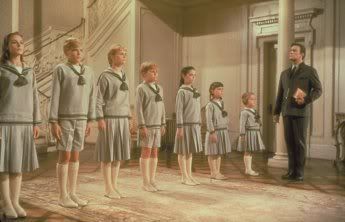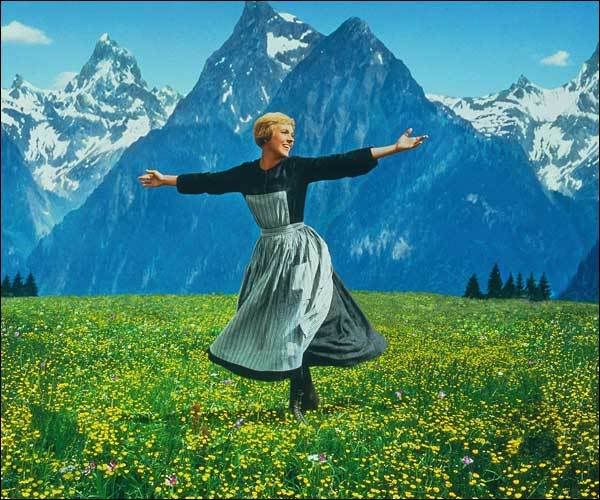Heavenly Mother and the Sound of Music
In her 1998 talk previously referenced, Carol Lynn Pearson compares several well-known movies to the problem of Heavenly Mother in the LDS Church. She states that people everywhere have a universal longing to know of the Divine Female, and this is reflected in popular culture. In passing, she mentions "Peter Pan"--who "needs a mother so bad that he goes out and steals one!" But the first movie she really analyzes in her talk is "The Sound of Music."

Carol Lynn describes the setting of this film as a sad, militaristic patriarchal household. Discipline is the order of the day, imposed by the “Captain.” Titles and the military are important in patriarchal thought, Carol Lynn observes. Into this situation comes the magical woman. Down from the hills, the holy woman, right out of the convent. She is a troublemaker. The captain is not pleased. She brings a female presence into the household. She sings of very feminine things. She works her magic with the children. The children sing the song that Maria taught them, and Captain is amazed “You brought music back into the house. I'd forgotten. Please stay.” To this Carol Lynn comments, "What a day it will be when our patriarchy says, 'You’ve brought the feminine back into the house, I’d forgotten, please stay.'" In her recounting of this story, Carol Lynn seems to see Maria as symbolic of both the Heavenly Mother and symbolic of those in the Church who work to see her recognized as a valid and vital reality in Mormon theology. These women (and men, sometimes) are troublemakers. Their goal is to bring the Divine Feminine to the forefront, where the entire Church can feel her effect upon them.
Soon the Spirit of the Feminine is banished from the Von Trapp household. Her loss is sorely felt. The children go to the abbey to get her back. Says Carol Lynn: "Children should not be passive when they need their mother back. I have a right to knock on any door and demand my mother back." I am continually surprised and delighted to observe how Carol Lynn gets away with saying things like this. Many others have been disciplined for less. I know I'd never be able to get away with a statement like that. Readers, what do you think protects Carol Lynn from the watchful eye of the patriarchy? Is it a good relationship with local leadership? Is it her admired public persona?

At the conclusion of "The Sound of Music" the organ plays a wedding melody, which segues into “how do you solve a problem like Maria?" We now know that instead of being the problem, Maria is the answer. Carol Lynn asks her audience: "How do you solve a problem like Lavina? Or Janice? You love them, allow them, support them-- helping to transform the patriarchal household into a partnership." I often wonder how this could have been done. How could Lavina's and Janice's and Margaret's ideas been integrated and supported and loved by a patriarchal leadership? What a fascinating era it would be to even today have the voices of these intelligent spiritual women heard in the mainstream Church. Having rubbed shoulders for a small time with each of them, I recognize their strivings to have the Spirit guide their lives and their teachings as much as the majority of male leaders I have encountered.
As the film ends, the "fatherland" calls, but the Captain has now been enlightened. He recognizes the value and power of a combined male/female unit. He has greater resources, and with the help of the Holy Woman, he and his family climb the mountain to freedom. Carol Lynn ends her exposition on this film with these words: "I invite the patriarchy to fall in love with me and I promise to be a devoted and useful partner."
(Succeeding posts will address Carol Lynn's thoughts on "The Secret Garden" and "Mary Poppins.")
Labels: Divine Feminine, spirituality









5 Comments:
Heavenly Mother is a "problem?"
This is great stuff, BiV! I just started reading a book called "Jesus and the Goddess." Historically patriarchal Christianity and Goddess worshipping religions have not gotten along (to the tune of thousands of deaths). The author thinks that both can be benefitted by the presence of the other. We desperately need more feminine influence at all levels of church leadership, and I want to know more of my Mother.
onelowerlight, I think you've misread. Heavenly Mother is not a problem per se, but people who want to know more about Her are treated as problems by church heirarchy.
That is amazing how well The Sound of Music works as a metaphor for Heavenly Mother. I remember when I was a kid my Mormon feminist mom pointing it out as questionable that the way to "solve a problem like Maria" was to marry her off. It's nice to see that there's a positive alternate interpretation. ;-)
(Though I still think the two main love songs -- "sixteen going on seventeen" and that other duet about the the wicked naughty girl hardly deserving love -- are really awful...)
I got to review them just now since my kids help me blog, and when my five-year-old Nico saw the pictures on your blog, he asked why there were pictures from "the Fraulein Maria movie" and asked me to put on The Sound of Music for him to watch. :D
it's not that heavenly mother is a problem, but rather that she is perceived as a problem--more specifically that her presence in worship (definitely public, but also private) is perceived as a problem--by those who fail to understand the symbiotic relationship between male and female, both in human and divine terms.
i still find _the sound of music_ problematic as a representation of the divine feminine, both for the reason c.l.'s mother identified and because maria is almost exclusively a nurturing mother figure. i believe our goddess is more than simply a nurturing mother. that is not a statement against the value or importance of nurturing mothers; merely an assertion that there is more to being a woman than being amother.
Amelia, you're right, and I think perhaps that is why Carol Lynn used several different films to illustrate the Divine Feminine in Mormon thought. In the Secret Garden, there is no "mother figure," rather the Heavenly Mother is represented by the power of creation, growth, and healing. Stay tuned for the final post in this series!
Post a Comment
<< Home